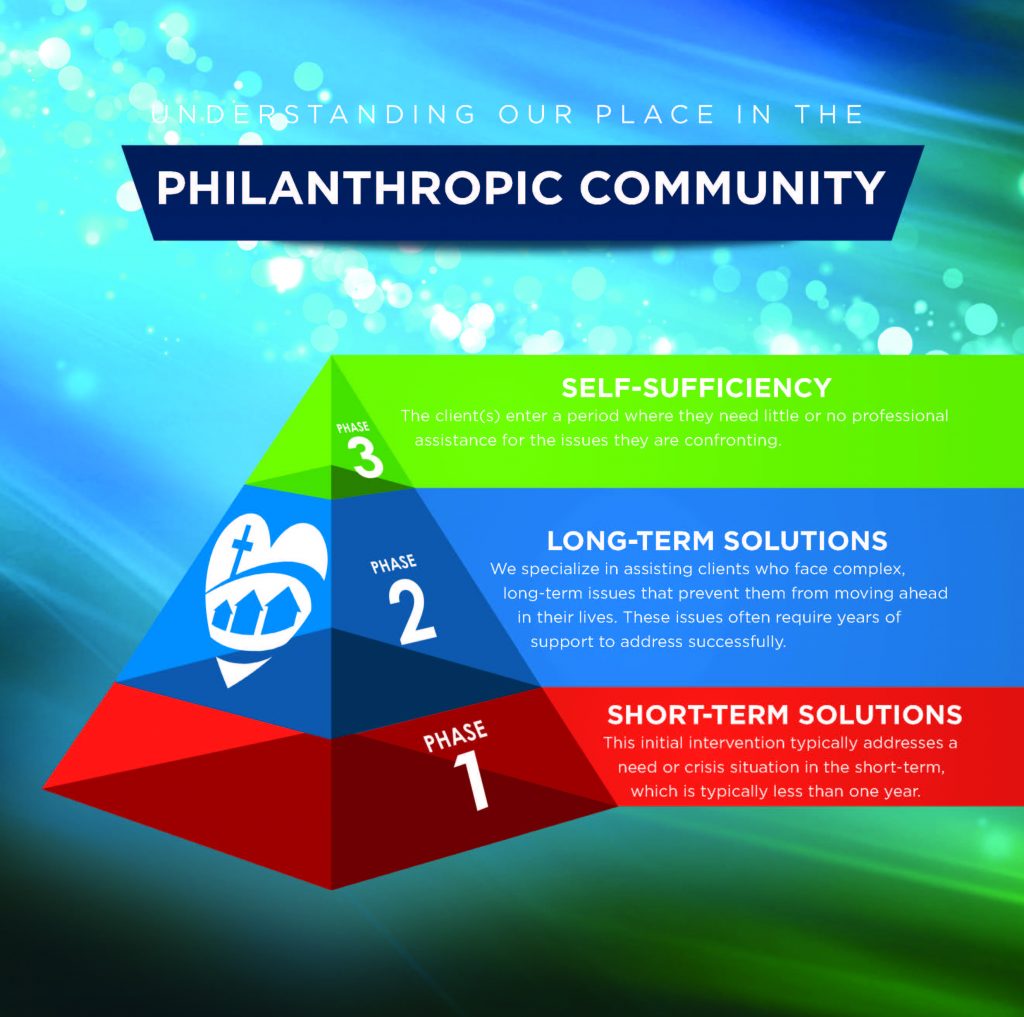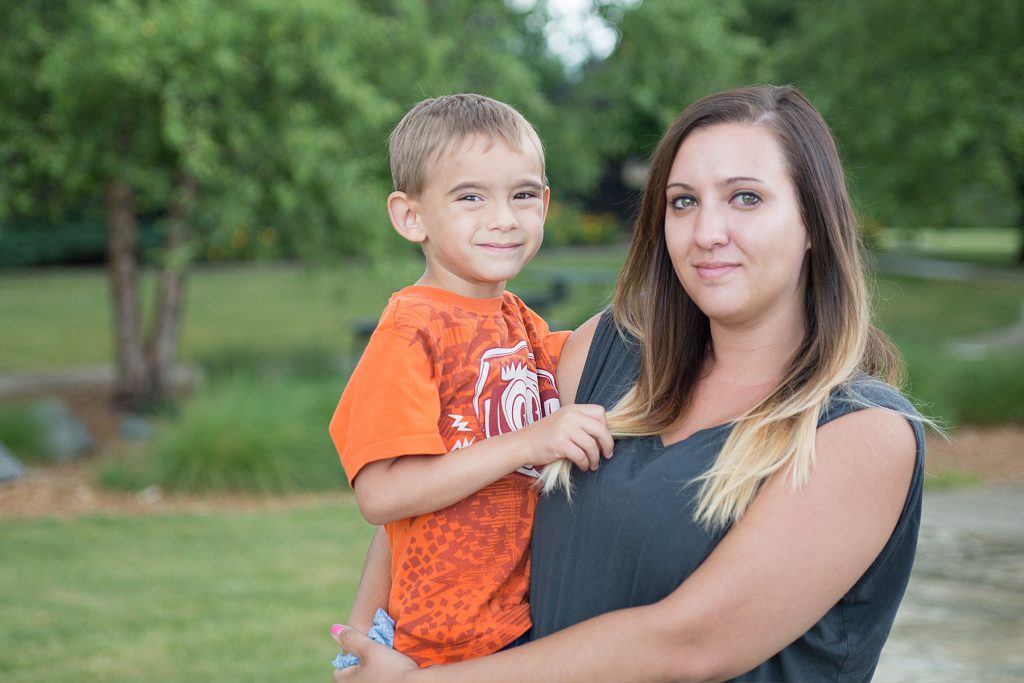July 18, 2017 // Diocese
Providing local, Catholic solutions to complex human problems
The Catholic Charities Service Pyramid consists of three phases. Phase 1 — Short-Term Solutions; this initial intervention typically addresses a need or crisis situation, which typically lasts less than one year. In Phase 2 — Long-Term Solutions, Catholic Charities specializes in assisting clients who face complex, long-term issues that prevent them from moving ahead in their lives. In Phase 3 — Self-Sufficiency, the client(s) enter a period in which they need little or no professional assistance for the issues they are confronting.
Many ask, what sets Catholic Charities apart from other philanthropic organizations in the communities of the Diocese of Fort Wayne-South Bend? This is the question that will be addressed in this series.

The Catholic Charities Service Pyramid consists of three phases. Phase 1 — Short-Term Solutions; this initial intervention typically addresses a need or crisis situation, which typically lasts less than one year. In Phase 2 — Long-Term Solutions, Catholic Charities specializes in assisting clients who face complex, long-term issues that prevent them from moving ahead in their lives. In Phase 3 — Self-Sufficiency, the client(s) enter a period in which they need little or no professional assistance for the issues they are confronting.
First, it is important to know what guides us. Catholic social teaching instructs the baptized to view those they serve in their full humanity, that is, as people with both great needs and great potential. As a result, we strive to be models of God’s love and mercy, offering true compassion to those in need while empowering them physically, mentally, emotionally and spiritually to live as full a life as their capabilities will allow.
Many Catholic Charities clients come to the organization facing some short-term crisis to meet basic needs, such as adequate food, clothing or a place to live. We refer to this initial intervention as Phase 1 Services (see the Service Pyramid), which typically last less than one year.
However, the real focus of Catholic Charities’ work is why someone comes to us under such circumstances. Those unmet basic needs are often symptomatic of more complex, long-term issues that prevent these people from moving ahead in their lives. These secondary interventions are described as Phase 2 services, which often require years of professional support to address successfully.
Failure to confront long-term issues can have dire social and personal consequences. Consider Rachel, a teen, who discovered she was pregnant in high school and made the pro-life decision to parent her baby.
Statistically Rachel only has a 40 percent chance of completing her high school diploma. In most instances, she would be one of the 60 percent who drop out, only to face a lifetime of poverty due to lack of adequate education.
This is why Catholic Charities offers Education Creates Hope and Opportunity, a program designed to help teen parents like Rachel complete their diplomas and, in many cases, pursue education beyond high school.
ECHO often picks up where a Phase 1 help-center services end, providing long-term case management so a teen mother can be successful in raising her child while staying in school. Case managers assist her by going into the school and making an education plan with the mother’s teachers. Case managers also help with strengthening strained family relationships and engaging other support services such as WIC, day care and, as needed, affordable housing. And because faith is at the center of all Catholic Charities does, it lends spiritual guidance, helping her recognize God’s plan for her life.
Since 1998 the ECHO program has served 863 young moms, whose graduation rate exceeds 90 percent due to its services. With this local, long-term program, Catholic Charities helps fulfill a tremendous social need by breaking the cycle of poverty and reducing government outlays, which typically exceed $600,000 per family. It also fulfills the church’s social teachings of solidarity and subsidiarity by helping young mothers with material, emotional and spiritual needs so they can reach their greater potential.
So many of the vulnerable in our communities are forgotten after the food and clothing are dispensed. It is the Catholic mission to address the long-term issues that they face, so they can live up to their God-given potential. This is how Catholic Charities strengthens families and alleviates poverty.
Rachel’s story

When Catholic Charities stepped in to assist Rachel five years ago, she was a pregnant high school student. The assistance of her case manager and Catholic Charities’ programs allowed her to successfully complete her education and still parent her son.
When Catholic Charities stepped in to assist Rachel five years ago, she was a pregnant high school student. The assistance of her case manager and Catholic Charities’ programs allowed her to successfully complete her education and still parent her son.
At the age of 17, Rachel got pregnant. As a senior in high school, she had many plans, but now found herself uncertain, frightened and overwhelmed.
She was afraid of telling her parents the news, so she confided in her school guidance counselor. After learning more about her circumstances, the counselor introduced Rachel to Catholic Charities’ ECHO program, which is designed to help pregnant teens stay in school while they complete their high school diplomas.
ECHO is unique because it provides teens with high school-based support, transition assistance to college, long-term engagement (which can last until age 24, if necessary), and a great variety of Catholic Charities support services that can be brought to bear on their behalf.
Rachel immediately bonded with her ECHO case manager. “Natalie was very uplifting, providing me with resources and the parental guidance I lacked at the time,” she said.
Every school day for a teen mother is complicated by having to consider her child’s health, finding child care while she is at school, allotting time for school work and making sure her child receives enough attention.
When Natalie came on the scene, Rachel’s life was pretty chaotic. She had family troubles and, because of her pregnancy, she was struggling to get to class. Natalie helped by first giving her encouragement, which included staying in school and staying connected to her church.
“These young moms so often just lack any kind of support,” said Natalie. “When they know they can count on us to be there, it makes all the difference.”
At school, Natalie talked to Rachel’s guidance counselor and teachers. She helped rearrange tests, change homework due dates and address other logistical problems brought about by the pregnancy. She also helped arrange services such as Medicaid, to cover health care costs; child care, so she could attend classes; and an introduction to the Women’s Care Center, where Rachel could earn coupons to buy baby supplies. She also sometimes provided transportation when Rachel needed a lift to a doctor appointment.
With Natalie’s help, Rachel graduated from high school on time when she was 18 and six months pregnant.
When Rachel’s son was born that August, he was premature; so Natalie helped arrange child-development assessments through First Steps to make sure he was meeting his milestones. She also arranged counseling for Rachel so she could better cope with all her struggles at home and with being a new mom.
Eventually Natalie got Rachel enrolled at Ivy Tech, taking courses to become a medical assistant. She graduated in 2016. Rachel is now 23 and her son is approaching his fifth birthday. As she looks back on her experience, she reflected on her experience with ECHO.
“I can never repay Natalie and Catholic Charities for all the help and support they have given me,” she said.
The best news. Delivered to your inbox.
Subscribe to our mailing list today.






